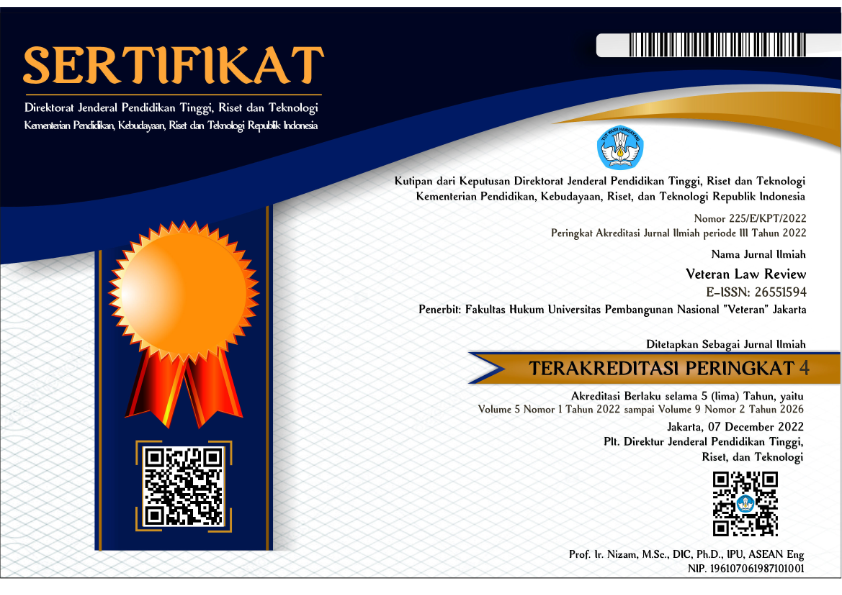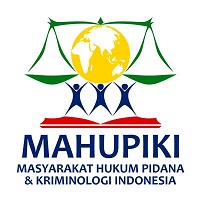The Implementation of Good Governance Concept In Letter Evidence Submission Regulation For E-Litigation Cases
DOI:
https://doi.org/10.35586/velrev.v6i1.4843Keywords:
Letter of Evidence, e-Litigation, Good GovernanceAbstract
The modernisation of public institutions aims to address issues of openness and community accountability of public institutions as well as making public services more responsive to the needs and aspirations of the community. The judiciary also complies with the community's requests that it implement the fundamentals of sound government. The 2010–2035 Judicial Reform Blueprint, which stresses using information technology to restructure and supports this. E-Litigation is a byproduct of Indonesia's judicial reforms. SK KMA RI Number 129/KMA/SK/VIII/2019 and PERMA 1 of 2019 provide as the legal foundation for electronic litigation. The principles outlined in the idea of good governance in terms of legal philosophy must be followed in the implementation of e-Litigation. This is in accordance with the principles of good governance, which deal with regulations pertaining to the validity of evidence submitted in e-Litigation of civil cases, that are responsive, effective, and efficient at the implementation stage. This research intends to examine the concepts of good governance, the legal foundation for e-Litigation in Indonesia, and the application of responsive, effective, and efficient principles to control the admissibility of documentary evidence in e-Litigation in civil cases. By taking a statutory method, this study adopts a normative approach to law. According to the study's findings, Indonesia's regulations on the admissibility of evidence in civil e-Litigation cases obstruct the fulfillment of responsive, effective, and efficient e-Litigation implementation principles. As a result, the legal framework of the rule governing the admissibility of evidence in Indonesian civil e-Litigation has to be modified to comply with good governance principles.
Downloads
References
Internet Articles
Makmur, I. (2019, December 2). Bentuk Persidangan Yang Baru Bernama E-Litigation.
Nofriandi, P. (2019, August 19). Ketua Mahkamah Agung: E-Litigasi, Redesain Praktek Peradilan Indonesia.
Paper Article
Satria, R. (2019). Persidangan Secara Elektronik (E-Litigasi) di Pengadilan Agama.
Book
Marzuki, P. M. (2010). Penelitian Hukum. In Penelitian Hukum. Kencana Prenada Media Group.
Journal
Handayani, F. A., & Nur, M. I. (2019). Implementasi Good Governance di Indonesia. Pemikiran Administrasi Negara, 11(1), 1–11.
Hidayat, S. (2016). Menimbang Ulang Konsep Good Governance: Diskursus Teoretis. Masyarakat Indonesia, 42(2), 151–165.
Kharisma, B. (2014). Good Governance sebagai Suatu Konsep dan Mengapa Penting dalam Sektor Publik dan Swasta (Suatu Pendekatan Ekonomi Kelembagaan). Buletin Studi Ekonomi, 19(1), 9–30.
Rishan, I. (2019). Pelaksanaan Kebijakan Reformasi Peradilan Terhadap Pengelolaan Jabatan Hakim Setelah Perubahan Undang Undang Dasar 1945. Hukum Ius Quia Iustum, 26(2), 259–281. https://doi.org/10.20885/iustum.vol26.iss2.art3
Setiadi, E. (2015). Pengaruh Globalisasi dalam Hubungan Internasional. International and Diplomacy, 1(1), 1–8.
Trommel, W. (2020). Good Governance as Reflexive Governance: In Praise of Good Colleagueship. Public Integrity, 22(3), 227–235. https://doi.org/10.1080/10999922.2020.1723356
Ulfiaha, S. A., Khairunissab, V. L., & Latifianic, D. (2021). Urgensi Pelaksanaan E-Litigasi dalam Persidangan Perkara Perdata pada Masa Pandemi Covid-19. Surya Kencana Satu: Dinamika Masalah Hukum Dan Keadilan, 12(2), 150–162.
Reports
The International Bank for Reconstruction and Development. (1992). Governance and Development. The World Bank.
United Nations Development Programme. (1997). Governance for Sustainable Human Development.
Thesis
Marwoto, H. A. (2015). Analisis Penerapan dan Pengaruh Good Governance Terhadap Kinerja Pemeriksa BPK Perwakilan Lampung. Universitas Lampung.
Regulations
Burgerlijk Wetboek (S.1847-23).
Herziene Inlandsch Reglement (S. 1848-16).
Peraturan Mahkamah Agung Republik Indonesia Nomor 1 Tahun 2019 tentang Administrasi Perkara dan Persidangan di Pengadilan Secara Elektronik.
Rechtsreglement voor de Buitengewesten (S. 1927-227).
Surat Keputusan Ketua Mahkamah Agung Republik Indonesia Nomor 129/KMA/SK/VIII/2019 tentang Petunjuk Teknis Administrasi Perkara dan Persidangan di Pengadilan secara Elektronik.
Undang-Undang Dasar Negara Republik Indonesia Tahun 1945.
Undang-Undang Republik Indonesia Nomor 12 Tahun 2011 tentang Pembentukan Peraturan Perundang-undangan.
Undang-Undang Republik Indonesia Nomor 14 Tahun 1985 tentang Mahkamah Agung.
Undang-Undang Republik Indonesia Nomor 35 Tahun 1999 tentang Ketentuan-Ketentuan Pokok Kekuasaan Kehakiman.
Downloads
Published
How to Cite
Issue
Section
License
Copyright (c) 2023 Veteran Law Review

This work is licensed under a Creative Commons Attribution-ShareAlike 4.0 International License.
Copyright (c) 2022 Veteran Law Review Journal
Veteran Law Review © 2022 by Faculty of Law Universitas Pembangunan Nasional "Veteran" Jakarta is licensed under Creative Commons Attribution 4.0 International

1. License
The non-commercial use of the article will be governed by the Creative Commons Attribution license as currently displayed on Creative Commons Attribution 4.0 International.
2. Author(s)' Warranties
The author warrants that the article is original, written by the stated author(s), has not been published before, contains no unlawful statements, does not infringe the rights of others, is subject to copyright that is vested exclusively in the author, and free of any third party rights, and that any necessary written permissions to quote from other sources have been obtained by the author(s).
3. User/Public Rights
VELREV's spirit is to disseminate articles published are as free as possible. Under the Creative Commons Attribution-ShareAlike 4.0 International License. VELREV permits users to copy, distribute, display, and perform the work for non-commercial purposes only. Users will also need to attribute authors and VELREV to distributing works in the journal and other media of publications.
4. Rights of Authors
Authors retain all their rights to the published works, such as (but not limited to) the following rights;
- Reproduce the work
- Prepare derivative works based upon the work
- Distribute copies of the work
- Perform the work publicly
- Display the work publicly
- Copyright and other proprietary rights relating to the article, such as patent rights,
- The right to self-archive the article,
- The right to enter into separate, additional contractual arrangements for the non-exclusive distribution of the article's published version (e.g., post it to an institutional repository or publish it in a book), with an acknowledgement of its initial publication in this journal (Veteran Law Review).
5. Co-Authorship
If the article was jointly prepared by more than one author, any author submitting the manuscript warrants that he/she has been authorized by all co-authors to be agreed on this copyright and license notice (agreement) on their behalf, and agrees to inform his/her co-authors of the terms of this policy. VELREV will not be held liable for anything that may arise due to the author's internal dispute. VELREV will only communicate with the corresponding author.
6. Royalties
Being an open accessed journal and disseminating articles for free under the Creative Commons license term mentioned, author(s) are aware that VELREV entitles the author(s) to no royalties or other fees.
7. Miscellaneous
VELREV will publish the article (or have it published) in the journal if the article’s editorial process is successfully completed. JOSI's editors may modify the article to a style of punctuation, spelling, capitalization, referencing, and usage that deems appropriate. The author acknowledges that the article may be published so that it will be publicly accessible and such access will be free of charge for the readers as mentioned in point 3.

















